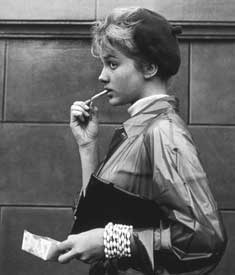Just finished watching the Bob Dylan documentary that was on PBS ; what a fucking weird person. You can almost feel the wrench being thrown in the film's otherwise user-friendly texture by the MASSIVE WEIRDNESS that is Bob Dylan. By turns mercurial and taciturn, always refusing to give a simply-true answer (which is not charming or deep, but extremely frustrating), Dylan confronts the movie with the unfortunate paradox that this artist whose heart we think we have deduced from his hundreds of his songs is a complete enigma, almost a non-entity. He is so completely detached from his own life, from commenting on his work, from trying to place/label himself, you wonder how the man ever wrote a song in his life! Not to mention his completely dessicated, almost tacky appearance. And yet it is undeniably the same person.
By the way, undoubtedly Scorcese's best film since Goodfellas...
-- Musical development seems more and more like Seinfeld's routine about women's fashion: each season, they hide a different body part, until when the next season, they cover up some other part and reveal the long-awaited (say, calves), men go crazy. A rock act that turns acoustic. A rapper who puts out a pop song. An acoustic act that turns rock. A psych-noise-folk group who turn pop. A tough, forbidding artist putting out a sensitive ballad. Unbelievably, this is continually shocking to music critics and audiences everywhere. The fiction that people "grow" as artists is more laughable every year, when inevitably they are just shuffling the cards.
-- You can't get rid of your friends or quit a job very easily, or move, or get a new wardrobe, or anything very easily. So, on one hand, you see it taking an awful long time for people to drop out of things and become their parents already, just because they are still going through the motions. And on the other hand, it is a pretty arduous, tortuous grind to try and do anything interesting with your life.
-- This Side of Paradise is pretty crappy, but I am reminded of something wise a drunk told me at a party my parents had when I was in high school. I was reading The Great Gatsby, or about to start, and he said: Oh, Great Gatsby, that's one of my favorite books. There's a lot of truth in that book. They probably won't teach you this in school, but the rich characters in that book, they are a lot like crabs. In New England, when you go crab-fishing, the first crab that you catch, you have to put a lid on your bucket, or else it will crawl out and try to escape. But once you have a couple in there, they pull each other back in, if one tries to leave. Now, surely he heard this from somewhere else but damn if that doesn't sum the Great Gatsby up perfectly. Also this reminds me of reading "The Killers" by Hemingway the other day and crying at the part when the Swede says, “There ain’t anything to do now.” And Nick: “Couldn’t you fix it up some way?” “No. I got in wrong.”
-- The more Lacan you read, the more you cut people slack for being in some fucked-up intersubjective position vis-a-vis you, or for acting out on behalf of some field of the Other, or for erratic contradictions and most of all, instead of "taking the magic" out of things like love, what is more remarkable (like the movies, like Nabokov, etc), what is even more incredible about love (or other neurotic processes) is how perfectly they function even when we know how they work. Any "common-sense" criticism of this aspect of theory misses the point that there is no *undoing* the logic of these systems; they don't dispel once they are named.
Sunday, July 30, 2006
Subscribe to:
Post Comments (Atom)


No comments:
Post a Comment